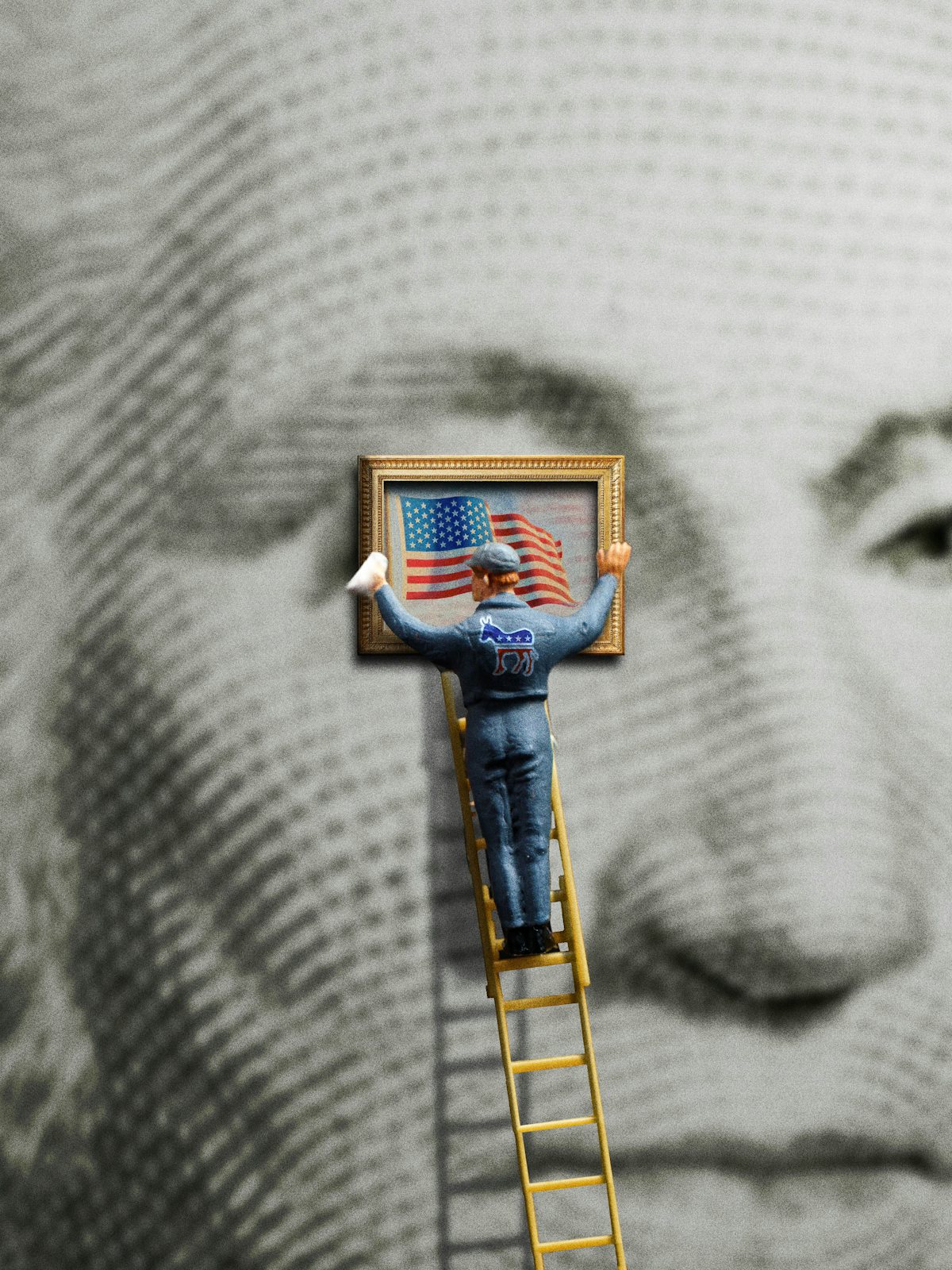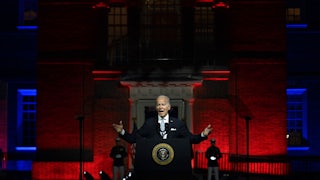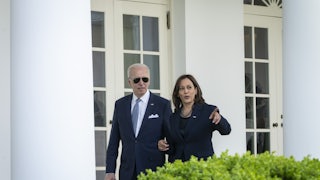Conservatives have convinced most Americans that the free market means personal freedom. And it does, for those with the means to eat at high-end locavore restaurants or purchase the right to skip the lines at Disney World. But that isn’t most people. Most people live with a constant, low-level anxiety about potential job loss or unexpected bills. An ongoing Economic Anxiety survey sponsored by American Public Media’s Marketplace found in October 2020 that more than half of all Americans were fearful of losing their jobs, and nearly half couldn’t cover an unexpected $250 expense. Yes, this was during the pandemic, when economic anxiety was certainly nudged higher, but anxiety has been a fixture for many Americans since the survey began in 2015. Millions of Americans live in towns where the free market has produced for them the career options of working at the Dollar Store or selling a little Oxy.
What sort of freedom is that?
Democrats need to change that—to change, as Joe Biden was fond of saying when he unveiled his ambitious economic plans in the spring of 2021, the “economic paradigm.” The Biden administration has made some commendable progress in altering the economic circumstances of Americans, even if inflation understandably dulled the luster of the biggest GDP increase in almost 40 years and record employment gains (6.6 million jobs). But the immense difficulty the administration has faced, even within the Democratic Party, in passing the legislation it has passed—having to downsize the (originally) $3.5 trillion Build Back Better bill to the Inflation Reduction Act, which invests a little more than one-tenth of that amount—showed that the battle of ideas will be a long one.
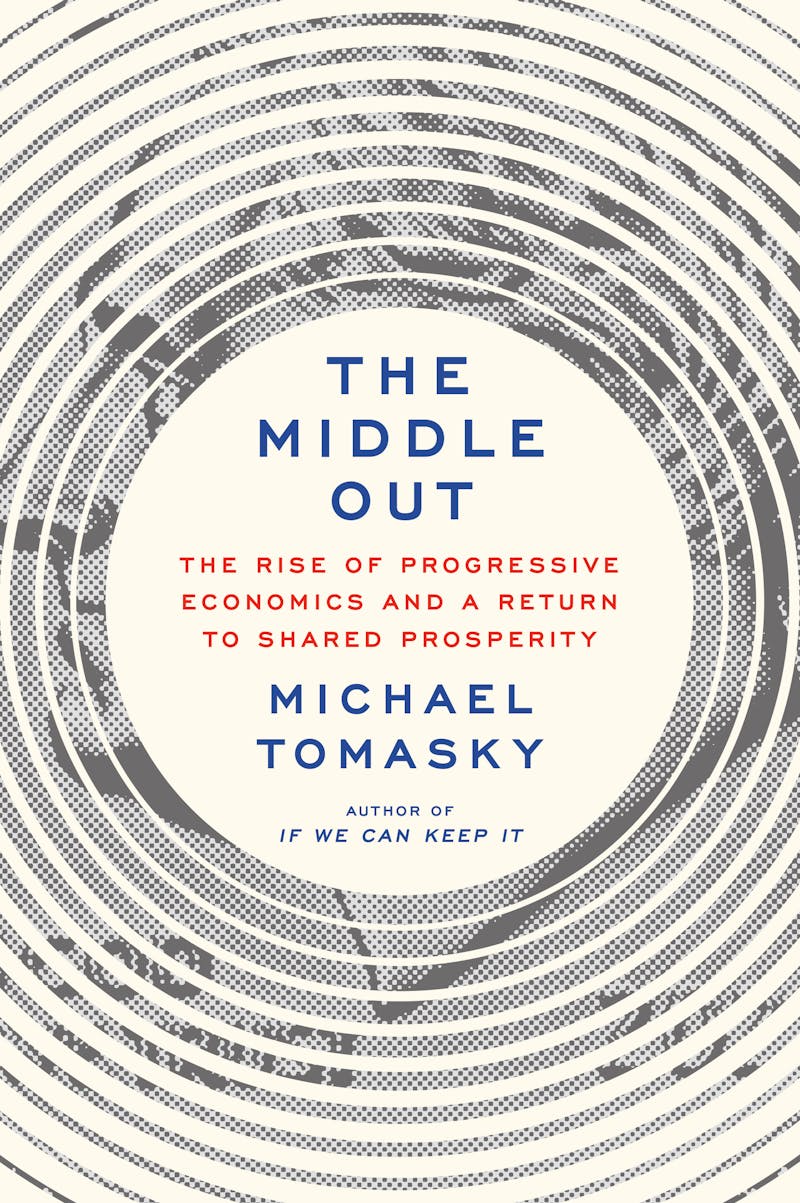
Here is a truism of our political discourse that is not widely enough recognized: The right thinks in terms of morals, while the left tends to see matters through an economic lens. That is, ask someone on the right what ails the United States, and he or she will almost certainly begin with a discussion of moral decay: We’ve lost our way, left God, abandoned the old values of thrift and hard work that made America great. Ask someone on the left the same question, and she or he will much more likely start by citing statistics on wage stagnation and the transfer of wealth from the middle class to the rich over the last 50 years.
It’s not hard to see why, to your average person, the right-wing argument is more compelling. It’s emotional. It resonates. Everyone in the world thinks things were better when they were young. Nearly everyone is patriotic in a basic, uncomplicated way. Most people are religious to one degree or other. So the right’s rhetoric along these lines hits home. And the hypocrisy argument doesn’t work. No matter how many evangelical preachers are caught in love nests, no matter how much un-Jesus-like hatred some of them spew from their pulpits—this perception will never be dislodged.
So the broad left, by which I mean everyone from the House members who make up the Squad to more centrist senators, can’t win a morals argument. True, Joe Biden’s deeply held Catholicism has helped bulletproof him against charges of radicalism. Nonetheless, religious morality is not the terrain on which the left will win political arguments. We can win, though, on economics.
Here’s why. People have two lives: material and spiritual. Modern liberalism is ill-equipped to make people’s lives spiritually better. But it can make people’s lives materially better—with better wages and health care, less fear of financial crisis, better roads, a faster internet, and more. If liberalism can deliver those things, I believe it can cobble together an electoral coalition that can win most of the time. But we can’t do it solely by citing statistics. We—more precisely, elected Democrats, because they’re the ones who have the megaphone—can win by tying economic policies to the larger ideas that Americans care most deeply about: democracy and freedom.
Democrats tend to see these as separate fights. Their view reflects to a considerable extent the way the progressive infrastructure is organized: Some people and organizations work on economic issues; other people and other organizations take on democracy issues; and as for freedom issues, well, pretty much no one works on those. The concept of freedom, as I’ll explain, is one the left has almost completely ceded to the right. What Democrats and progressives have to understand is that, today, they cannot afford to abandon it, and these aren’t separate fights. It’s all one argument: Economic inequality and concentration of wealth and political power in the hands of the few weaken democracy and limit freedom. Conservatism has tended to recognize these connections and to fuse them into one argument, and it has done so to considerable success. It’s time for Democrats to seize that high ground. Recognizing these connections and arguing that strengthening the working and middle classes also strengthens democracy and expands freedom are the surest ways to advance all three goals.
Before we get to our current times, let’s examine how the concept of freedom became so wholly owned by the right. It goes back to the 1930s, and it was through an effort led by free-market economists who fretted that individual liberty was threatened in the modern world possibly to the point of extinction. Remember, this was a time, the mid-1930s, when Stalin and Hitler had consolidated their holds on power. So the concern about individual freedom, with respect to the Soviet Union and Nazi Germany, had a lot of merit to it. More controversially and dubiously, the free-market economists extended the critique to New Deal liberalism. Ludwig von Mises, for example, generally the most uncompromising libertarian of the bunch, acknowledged that the New Deal was small-d democratic, in the narrowly electoral sense, according to the author Daniel Stedman Jones, but he emphasized that “it is obvious that delegation of power can be used as a quasi-constitutional disguise for dictatorship.” Henry Simons of the University of Chicago “firmly believed,” writes the historian Angus Burgin, “that the main direction of New Deal policies was toward authoritarian collectivism.”
In 1944, Friedrich Hayek, one of the most famous of this cohort, produced The Road to Serfdom, his broadside against state interventionism. In 1947, these men and other colleagues formed the Mont Pelerin Society, an international group of economists committed to free-market principles. They called themselves “neoliberals,” which is a confusing label today, because in our parlance, we’d call them conservatives; they were referring back to an older meaning of the word “liberal.” Like any group of intellectuals, they argued about this and that, including whether they should even attempt to influence public events in the first place, but they agreed on four core principles: rejection of collectivism; defense of markets; insistence on a link between economic and political freedom; and “an acknowledgment of the importance of moral absolutes.”
These thinkers were building on a very old idea, one that went back to John Locke politically and Adam Smith economically: that “freedom” meant freedom from—freedom from undue interference in one’s political or economic life by the state (usually the king, in those days). There’s another meaning of freedom, which is freedom to—the freedom to live up to one’s full human potential. This is a newer and more liberal definition of freedom (more liberal because it presumes that a vehicle is needed to best help people achieve this particular freedom, by offering them free community college and a safe place to stash their children while they attend class, and more; and that that vehicle is necessarily the state). But the conservative definition is older and, as is usually the case with conservative notions, a lot easier to explain.
In the United States, the most celebrated champion of these ideas was Milton Friedman. His famous 1962 book, which had sold half a million copies by the time the fortieth anniversary edition was published in 2002, was called Capitalism and Freedom. That is, Friedman didn’t merely extol a set of economic principles. He tied them to an idea Americans cherish. Not just Capitalism. Or Capitalism and Growth. Or Capitalism and Sound Monetary Policy. Capitalism and Freedom. The title announced, in other words, that the book wasn’t really about economics at all. It was about politics. It was about life. And the title of the book’s first chapter, which cuts right to the heart of things, is “The Relation Between Economic Freedom and Political Freedom.” That chapter’s very first paragraph gets right to the point; it’s a punch in Keynesian liberalism’s nose:
It is widely believed that politics and economics are separate and largely unconnected; that individual freedom is a political problem and material welfare an economic problem; and that any kind of political arrangements can be combined with any kind of economic arrangements…. The thesis of this chapter is that such a view is a delusion, that there is an intimate connection between economics and politics, that only certain combinations of political and economic arrangements are possible, and that in particular, a society which is socialist cannot be democratic, in the sense of guaranteeing individual freedom.
I disagree with every single word of that thesis, including the “and”s and “the”s, and believe it to be—know it to be—demonstrably wrong. To take but one of many available examples from recent human history, look at the U.K. in the mid-1960s: arguably at its dour socialistic nadir under the Labour Prime Minister Harold Wilson (he “nationalised” 90 percent of the British steel industry), but undergoing one of the most gobsmacking explosions of personal freedom in human history (rock and roll, loud amps, long hair, fashion, homosexuality decriminalized, and so on). Friedman’s argument is balderdash. While Wilson was crushing market freedom under the state’s remorseless jackboot, the young people of Swinging London were shagging their brains out. There are so many other examples. If Friedman were correct, the Scandinavian countries—liberal social democracies, and as such economic nightmares by Friedman’s lights—would all be gulags. But personal freedom is doing just fine in those nations. In fact, in the World Population Review’s Personal Freedom Index for 2021, Denmark, Finland, Norway, and Sweden all have higher personal freedom rankings than the United States. Friedman was either a liar or a fool, or both (yes, brilliant people can be fools).
Friedman’s idea of freedom, by the way, very much included freedom of school choice for Southern whites who fought tooth and nail to resist school integration after the Brown v. Board decision. He endorsed in Capitalism and Freedom Virginia’s diabolical “freedom of choice” plan to skirt Brown; elsewhere, he referred to “forced nonsegregation” and “forced segregation” as “evils,” allowing that, if forced to choose between them, he “would choose the former as the lesser” evil.
He was a malignant force in many ways. But I admit that he came up with a great way to open a book. Friedman is no cagey welterweight feeling the opponent out in round one. He’s a heavyweight who comes out swinging right at the opening bell. This is not about economics, he wrote. It’s about freedom. Your freedom, citizen. And by the way, how contemporary it still feels, with that reference to democratic socialism, made back when Bernie Sanders was still in college, probably just starting to dig into his Marcuse. And Friedman had a skill most economists, in my experience, do not: He could write, and speak, plain English. No wonder he won so many converts—along with the fact that his message was exactly what rich people wanted to hear!
So free-market economics took over. And liberals have never really had an answer. Joe Biden, of all improbable people, has tried to provide one. Never a crusading liberal, Biden always found the center lane of where his party was as a whole. If Ted Kennedy was over here to his left, and Sam Nunn was over there to his right, Biden would usually land in a place equidistant between them. But now the party had moved left overall, after the Great Recession and the torrent of activism unleashed in its wake (Occupy Wall Street, the Fight for $15 minimum-wage effort), so Biden did, too. In fact, he did something very unusual as a presidential candidate. The conventional wisdom is that candidates tack to left or right during the primaries but sidle toward the center in the general. But Biden, once he secured the nomination, moved left. And he won. And that’s why so many of us thought Build Back Better would pass—pared back, sure, but more or less intact, changing the economic paradigm and people’s assumptions about the free market.
And yet the roadblocks the administration hit—including within its own party—show how heavy a lift it will be to change those assumptions. Recall Senator Joe Manchin’s words, from late September 2021, when budget negotiations were grinding their way through the sausage machine: “I cannot accept our economy, or basically our society, moving towards an entitlement mentality. That you’re entitled. I’m more of a rewarding, because I can help those that really need help.” The sentiments expressed here tell us a lot about Manchin’s assumptions about the proper role of the public sector in an economy. From a neoliberal point of view, they are perfectly reasonable sentiments. If the government’s role should be limited to ameliorating market failure, then what Manchin says is right; one could hardly, in fact, expect him to say anything else. But if one sees a different and larger role for the public sector in providing supports for working people—supports that aren’t tied to employment in an era when far fewer people are working at the same factory for 45 years than when Manchin was growing up—then one would not talk the way he talked there. The intra-Democratic debate in the fall of 2021, excruciating as it could be to watch, showed that most congressional Democrats have embraced new economic thought to one degree or another. But not all have. And the public hasn’t; yes, the particular elements of the bill, universal pre-K and so on, poll very well, but there is little evidence so far that the broader public has been persuaded that what they have been taught for the last 40 years about the merits of the free market and limited government and the evil of deficits is wrong.
The individual elements of Build Back Better all polled well, as noted above. And arguably, if there had been just one more Democratic senator, or certainly two, a major bill would have passed. For those given to despairing about the Democrats—the default position of people on the broad left—I say take heart in at least this: The party has moved dramatically to the left on economic questions in the last decade (to some extent on cultural ones, too, which is more complicated politically). All House Democrats but one voted in favor of a $2.2 trillion Build Back Better bill, and 48 or maybe 49 out of 50 senators were prepared to vote yes as well. That’s a sea change from a decade ago.
It’s good that all that has happened. What hasn’t happened, however, is that, while Democrats propose generally good policies, they make no attempt to change people’s economic thinking; they haven’t really made a concerted effort to convince the broader electorate that the economic presumptions that have prevailed these last 40-plus years have failed them. It can be hard to make that case; the market these days produces an endless stream of bright, shiny objects for us to marvel over, to make us think we’re living in good times. We are living in a time of amazing innovation; but we are not living in a time of broadly shared prosperity. The central political-economic fact of the last 40 years in the United States is the massive transfer of wealth from the middle to the top. A Rand Corporation study in 2020 concluded that from 1975 to 2018, nearly $50 trillion in income had been moved from the middle class to the top 1 percent. Put another way, using numbers people can grasp: If all this money had not been shifted away from the middle class, the median individual income in 2018 would have been not the $36,000 it was, but about $57,000. That’s what neoliberal economics has done to the middle class. And while Republicans are far more responsible for this than Democrats, Democratic administrations bought into many neoliberal precepts, too; Bill Clinton privileged deficit reduction early in his term to reassure the bond market, pushed for free trade, and deregulated banks; Barack Obama proceeded cautiously out of the meltdown and pivoted toward deficit reduction during his first term. Both also made some bold Keynesian moves, but during both their terms, inequality rampaged and monopoly power intensified.
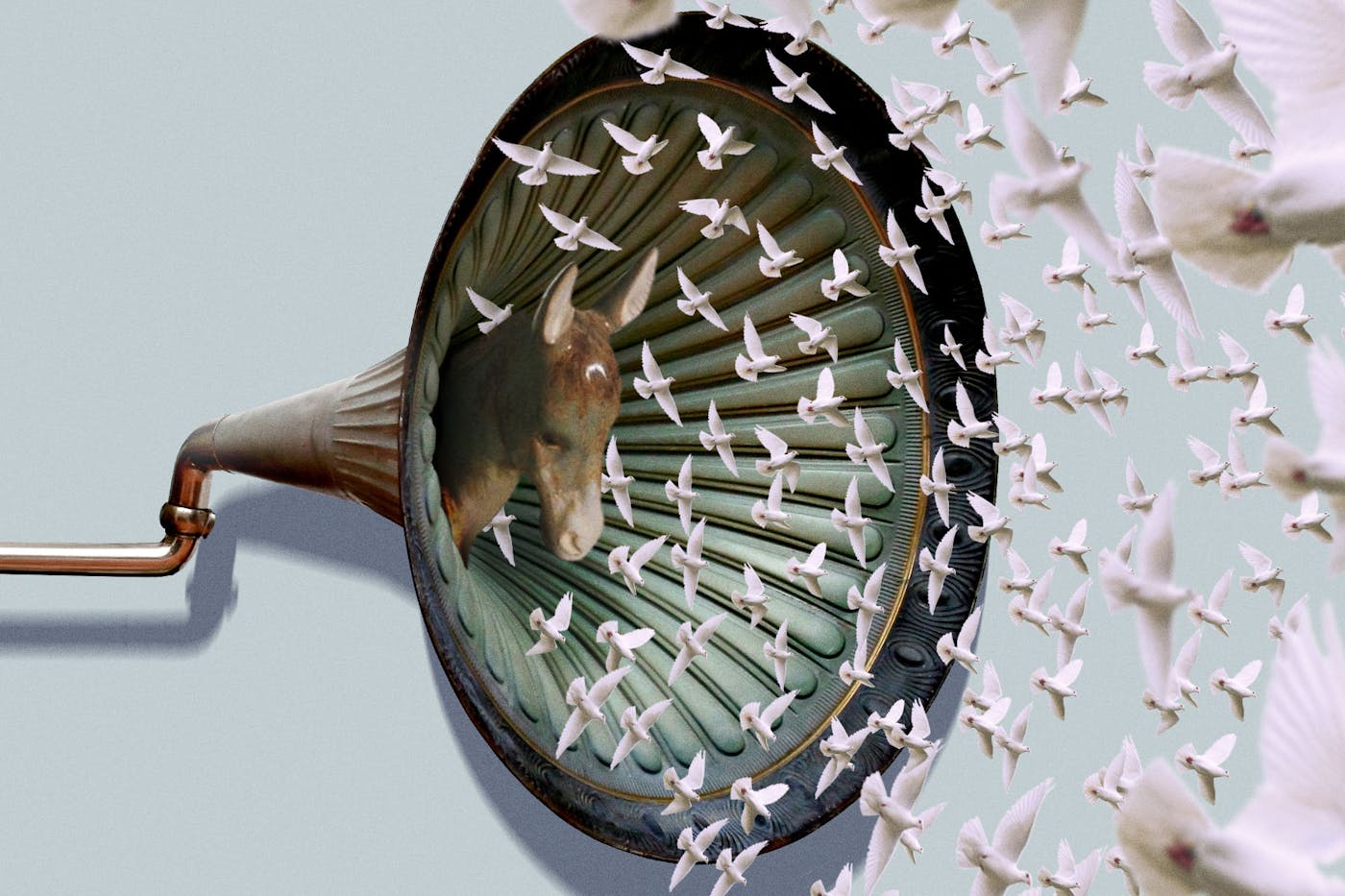
The statistics in the above paragraph are alarming, or should be; but this fight won’t be won with facts and figures. People don’t respond to those. What they respond to, even though many politicians tend not to believe this, are broad philosophical and moral arguments that connect specific policies to a vision of society as a place where a certain set of values obtains. In the 1970s, after the OPEC crisis and stagflation made Keynesianism vulnerable to attack, conservatives kicked the door down with exactly that: policy arguments (lower taxes, less government) made in service of a broader point about the kind of society they wanted to build (greater dynamism and freedom, as they defined it). Democrats have to do the same today. Here are three core arguments they need to make.
1. Destroy the myth of Homo economicus and replace it with a human being.
Economic debates in our political discourse proceed from the old assumption of neoclassical economics that individuals are rational actors who have perfect information and always act in their own self-interest and make choices that optimize their gain. There is a name for this rational actor: Homo economicus, or “economic man.” It assumes that we are all self-interested, and that acting selfishly promotes the common good. Adam Smith argued this; John Maynard Keynes disputed it. It is inherently right-wing, because it tells people this: Just fend for yourself, and your family. That is your only commitment to society. This idea is pernicious. Besides, it doesn’t reflect most people’s lived reality. Most of us spend part of our lives being dependent on others: when we are children, when we are sick, when we are old. Most of us also understand and accept that we are members of a broader society, and that membership carries certain obligations. We accept the idea that there is such a thing as the common good. People often act not out of self-interest but out of generosity. We are social creatures who crave not just material comfort and more stuff, but friendships and love and the approval of those around us.
Even most businesses—that is to say, even market capitalism—are governed not by relentless self-maximizing but by reciprocity and cooperation. Think of the chain of cooperation required to deliver, say, a television from a factory in China to your family room. That takes a series of actors working together—yes, all behaving in their self-interest, but all also working cooperatively to ensure that they get their share of the profit. In their 2012 book, The Rainforest: The Secret to Building the Next Silicon Valley, the venture capitalists Victor W. Hwang and Greg Horowitt write that cooperation is more important to successful capitalism than competition. “Rainforests” is their metaphor for successfully innovative firms and ecosystems. And rainforests, they write, “depend on people not behaving like rational actors” (my italics). They continue:
Extra-rational motivations—those that transcend the classical divide between rational and irrational—are not normally considered critical drivers of economic value-creation.… These motivations include the thrill of competition, human altruism, a thirst for adventure, a joy of discovery and creativity, a concern for future generations, and a desire for meaning in one’s life, among many others. Our work over the years has led us to conclude that these types of motivations are not just “nice to have.” They are, in fact, “must have” building blocks of the Rainforest.
So yes, motivations “include” competition, but they include those other factors as well.
Democrats need to talk expressly and directly about how capitalism isn’t simply about competition and how most human beings are not solely relentless self-maximizers. Today’s economic discourse in the realm of politics proceeds entirely from the old neoclassical, neoliberal, and Friedmanesque assumptions. Democrats have to insert new assumptions into that discourse.
Here’s why this is so crucial. If we proceed from the neoliberal presumption that we all should stick to pursuing our self-interest, then the only policy solutions that make sense are Republican ones. If people need only to advance their self-interest, then the state should mainly just get out of their way and let them pursue away. But if we proceed from a different set of assumptions built around the ideas that we are both self-interested and other-directed, and that our motivations for our economic decisions are multifaceted, then the policy solutions that make sense are more liberal.
This means Democrats need to talk not just about policies but about the ideas behind them. After all, it’s ideas, not lower prescription drug prices, that change the world. History’s greatest leaders have found ways to boil high-flung ideas down into language that most people could understand, and that is what Democrats have to do here: “My Republican friends believe that all we need to do is selfishly pursue our own interests, and everything will work out fine. We Democrats have a different view. We think people are more generous than that. We think people thrive on competition, yes, but we believe they value cooperation, trust, and the esteem in which they are held by others. And we think that the way we shape economic policy should reflect this more complex view of what motivates our behavior in the marketplace.” I promise you—the right would freak out if Democrats began aggressively talking like this. They would freak out because they would know deep down that most people feel this way about themselves and do not see themselves as simply self-interested creatures. If Democrats can put a fuller view of human nature back into economics—and into politics—they can put the right on the defensive and change the starting point from which debates about economics proceed.
2. Tie economics to democracy.
In the early days of the 2020 presidential campaign, Pete Buttigieg was asked by NBC’s Chuck Todd: “Are you a capitalist?” His answer was pretty brilliant, I thought: “Sure. Yeah. Look, America is a capitalist society. But: It’s got to be democratic capitalism. And that part’s really important, and it’s slipping away from us. In other words, when capitalism comes into tension with democracy, which is more important to you? I believe democracy is more important. And when you have capitalism capturing democracy, when you have the kind of regulatory capture where powerful corporations are able to arrange the rules for their benefit, that’s not real capitalism. If you want to see what happens when you have capitalism without democracy, you can see it very clearly in Russia. It turns into crony capitalism, and that turns into oligarchy.” In a little more than 100 words there, Buttigieg expressed a profound point. Economics and democracy are not the separate issues they are taken to be in the media. They are the same issue. The Mont Pelerin Society argued that once economic freedom was threatened (by a tax, or a new government program), political freedom was by definition under threat, and that as long as economic freedom—which they defined as a minimal state with low taxation—was maintained, political freedom would be safe. They were wrong. As we look around the world, from Hong Kong to Hungary, Georgia to Guatemala, we see that it is quite possible, indeed not uncommon, for countries to have economies that are essentially market-based even while they clamp down on political freedoms. Buttigieg invokes Russia above, and it, along with China, are perhaps the most obvious examples of countries with basically capitalist economies (state-capitalist, in China’s case) where political freedoms are severely curtailed. But there are many other such countries.
Recent experience right here in the United States is also on point. Donald Trump’s idea of capitalism is rapacious and almost completely unchecked by state intervention. Yet his idea of political freedom, as we have seen, is one of total disdain for concern about the rights of those who don’t support him politically. Trump has decoupled the ideas of economic freedom and political freedom more aggressively by far than any president in the history of the United States. This just makes it all the more urgent that Democrats re-couple economics and democracy.
Democratic elected officials need to explain to Americans, as Buttigieg said, that if the economic and political systems become too controlled by the wealthy; if inequality continues unchecked; if we don’t build a robust middle class; if we can’t deliver to middle- and working-class people the kinds of policies on offer in every other developed democracy, and on a permanent basis; if we can’t properly tax wealth; if we can’t create an ethos wherein businesses understand that their long-term interests are better served by a healthy democracy to which they contribute their share than by a corrupted and out-of-kilter one that asks little of them, then the impacts on democracy will be severe, and it will fail. This is a connection few politicians make. It’s of vital importance that they do.
Let me conclude this section with a story. We all know what Thomas Jefferson was doing in the summer of 1776: He was writing the Declaration of Independence. But less known, and more interesting, is what he did that fall. He went down to Virginia, where he was a member of the state legislature, and led the fight to abolish the commonwealth’s laws on primogeniture and “entail,” which kept large estates within families across generations. This is no mere coincidence. He, and all the Founders, knew that excessive inherited wealth was fundamentally incompatible with democracy. In a few months’ time, Jefferson laid the foundation for our political rights in Philadelphia and went to Richmond to curtail the unfettered economic rights of the rich. The Democrats need to say and say and say again what Thomas Jefferson clearly believed: A healthy democracy depends on a fair economy.
This story makes an important point. To the extent that present-day liberals seek historical justifications for a new economics, they always go back to FDR—to his Second Bill of Rights or his Four Freedoms, which I mention below. Occasionally, they mention TR’s trust-busting; a few cite Wilson and Brandeis. But the tradition I’m talking about here goes back to the Founders, and Democrats have to say that. To go back to FDR tells the swing voter, “We are building on only a liberal tradition.” To go back to the Founders tells them, “We are building on an American tradition.” The whole story is conveniently laid out for Democrats in the bracing early-2022 book The Anti-Oligarchy Constitution, by Joseph Fishkin and William E. Forbath. They cite numerous Founders making such arguments and note that the principle of economic redistribution was embedded in many early state constitutions. They cite Jefferson, Daniel Webster, and several others, including John Adams, whom they quote as saying (and remember that landownership in those days was the chief source of wealth accumulation): “The balance of power in a society accompanies the balance of property in land. The only possible way, then, of preserving the balance of power on the side of equal liberty and public virtue, is to make the acquisition of land easy to every member of society.” The relationship between economic and political equality is not a liberal idea. It’s an American idea.
Making this tie to democracy will help Democrats sell their economic program. It will blunt the right-wing criticism that they’re just interested in giving people handouts. Republicans will continue to say that, of course, but if Democrats explicitly connect paid family leave and free community college and the rest to the preservation and strengthening of democracy, and the great democratic purpose of advancing human happiness, and link all that back to the nation’s founding, they will put Republicans on the defensive. An argument fought on this terrain is one Democrats and the broad left can win.
3. Tie economics to freedom.
Today, the right owns the word “freedom.” Democrats and the broad left have to take it back and redefine it. Democrats today must say this: It is our economic vision that will give people freedom, and the Republican vision of freedom has left millions struggling, even in many cases in misery. Freedom is not freedom if you work full-time and live in poverty. Freedom is not freedom if a single medical crisis can drive you to bankruptcy. It is not freedom if childcare is too expensive for you to hold a job, or if you are born poor and at every turn are blocked in your rise: by underfunded schools, overpriced colleges, and usurious college loans. Not to mention women’s right to reproductive freedom, which the Supreme Court has just snatched away in its Dobbs decision (and the court’s right-wing majority is of course not stopping there). Or the right to go out in public without being gunned down: The first right of all, in many ways, is the right to be secure in one’s person. These are absolutely freedom issues. The Republican Party today is an anti-freedom party.
Liberals adore Franklin Roosevelt’s famous Four Freedoms speech to Congress from January 1941. What were those freedoms? Two of them were long-established and not controversial: freedom of speech and of worship. But the second two generated more attention and discussion—and controversy, because they were new at the time and, unlike the first two, not universally agreed upon in this country. They were freedom from want and from fear; a “healthy peacetime life” for people of all nations, and a “worldwide reduction in armaments” such that global peace was not threatened. It was that third in particular that has been attacked by the right, because a healthy peacetime life implies, well, exactly the kinds of things Joe Biden has been trying to conjure into reality.
The Democrats’ economic program today can fairly be described as seeking to advance Roosevelt’s Third Freedom. The expanded social safety net certainly attempts to provide freedom from want. But looked at another way, the programs they advocate provide people freedom to achieve their fullest potential, to change jobs without having to worry about their health coverage, to pursue their ambitions knowing that they can enroll their kids in a safe childcare facility, to try community college without falling into debt, to move to a new part of the country because taking such chances becomes less risky, or to stay in their hometown because a certain level of public investment has made it so that there are jobs and opportunity in town again.
This is what elected Democrats have to do: change these assumptions. As I argued above with respect to democracy, if the debate about what constitutes freedom proceeds from the existing assumptions—that less government equals more freedom, and that government assistance turns people into layabouts—then of course it will be hard to sell programs like paid family leave and subsidized childcare. But if we proceed from different assumptions—that the free market has reduced people’s freedoms by making their lives harder, and that smart government investments can open up options in people’s lives and increase their freedom—then those programs start from a stronger philosophical foundation and become easier to pass.
In selling such programs, today’s Democrats should flip the FDR formulation on its head: They should emphasize freedom to rather than freedom from. That is, instead of making arguments such as “subsidized childcare will free mothers from the worry about whether their children are safe,” they should make arguments such as “subsidized childcare will give women freedom to go out in the world and achieve their potential.” In fairness, some of them do this. Elizabeth Warren, the Senate’s leading advocate of childcare, talks this way much of the time. She tells the story of how her aunt Bee (yep, just like in Mayberry) came to care for her two small children, freeing Warren to keep her job. When Democrats emphasize freedom from, they can sound to people as if their goal is merely to build a bigger nanny state. But when they emphasize freedom to, they sound as if they are building this state as a means to an end: the freedom for more people to live happier, more productive lives. This kind of framing will prove much more resonant in our time.
This nation’s economic assumptions have changed twice in the last century, both times as a result of a crisis. The first was after the Great Depression, when we changed from the laissez-faire principles that had guided most economic policymaking for decades to the interventionist principles of Keynes. Those worked well for 40 years, until the next crisis, the stagflation crisis of the 1970s, which opened the door for the neoliberals to assert their arguments. The election in 1980 of a conservative president allowed their ideas to jump from op-ed pages and PBS to actual policy.
The things they said were never true. Tax cuts don’t pay for themselves. Lower taxes don’t bring in more revenue. The unregulated market not only didn’t fix everything but made a lot of things worse. But Republicans and the right-wing media were so in lockstep in repeating these untruths, and Democrats so undisciplined about rebutting them at their philosophical root, that they stuck around long past their shelf life. The Great Recession should have driven the neoliberal project into the grave; it should have been a “paradigm pivot” moment like the Great Depression and the 1970s stagflation, but it wasn’t, and a big part of why was that the Democrats didn’t have a direct answer to supply-side economics. And part of the reason why the Democrats didn’t have an answer was that the liberal infrastructure that feeds the Democratic Party energy and ideas—foundations, think tanks, academics, and activists—hadn’t developed that answer. A lot of people were working on it, but there was nothing resembling a consensus, and the two Democratic administrations of the period were internally divided on the answer, too. As the old saying goes, an explanation, even a bad one, beats no explanation.
So the paradigm didn’t shift after the Great Recession. But enough people were hungry for such a shift that things started happening. In the economics profession, among activists, in the foundation world, and within the Democratic Party itself, anger at economic inequality and other manifestations of rising oligarchy intensified. More brainpower, resources, and attention were focused on the problem. Meanwhile, Donald Trump got elected. The pandemic hit. The country was thrust back into crisis again—economic for sure, but not solely; this crisis, or these crises, were about democracy and public health (actually, life and death) as well as the economy. Maybe the door was open enough again, as it had been in the 1970s, for a new paradigm to charge through?
But now there was a new political reality that hadn’t existed in the 1970s: deep, stark polarization. In the 1970s, there was a large, persuadable middle that had soft ideological commitments and could switch from Carter to Reagan, from more or less trusting government to fully distrusting it. That isn’t true today. The persuadable middle then was approximately 20 percent. Now it’s closer to 5 percent. Convincing people to rethink things now will be a lot harder than it was in the 1970s: There are fewer persuadables, less margin for error. Also today, there is an alternative right-wing media that didn’t exist then, telling people that any domestic investment is socialism and will go to the (mostly not white) undeserving.
Thus will changing the paradigm be the work of many years. Can the Democrats, and the people in their orbit, do it? I think they can. They have popular policies, but they have to remove those policies from their silos and connect them to values and offer people a vision for themselves as individuals and for society at large, a vision that stirs people’s souls as Americans. They have to connect their economic ideas to ideals that Americans cherish—democracy and freedom. You can’t get much more American than democracy and freedom. They are core to our national project. And they are not separate from economic justice. They are inseparable. It is up to the Democrats to defend all three. And they must see this as not three fights but one.
Adapted from The Middle Out: The Rise of Progressive Economics and a Return to Shared Prosperity by Michael Tomasky. Copyright © 2022 by Michael Tomasky. Published by arrangement with Doubleday, an imprint of The Knopf Doubleday Publishing Group, a division of Penguin Random House LLC.
